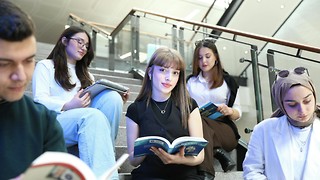New prize offers $100,000 for book outline
The ‘Nine Dots Prize’, sponsored by Cambridge University Press, asks candidates to submit a 3,000-word outline to the question ‘are digital technologies making politics impossible?’

An inaugural prize for ‘creative thinking’ will offer $100,000 (approximately £82,000) to outline an argument to the question: “Are digital technologies making politics impossible?”
The Nine Dots Prize is sponsored by the Kadas Prize Foundation, with support from CRASSH – a social sciences research centre – at the University of Cambridge and Cambridge University Press. It asks entrants to provide a 3,000-word response to the question, which will then be developed into a short book.
A board of twelve internationally-renowned academics, scholars, thinkers and authors will judge the award, with entries considered anonymously. It will include Cambridge Professors David Runciman, Paul Gilroy and Simon Goldhill.
Speaking about the prize, Professor Simon Goldhill, director of CRASSH and Chair of the Prize Board, said that it offered “an incredibly exciting and unique opportunity for thinkers to try out big ideas that have the potential to change the world. The Board will be looking for entries that display originality in everything from the ideas put forward to the ways in which those ideas are communicated”.
Professor Goldhill also emphasised the relevance of the question to contemporary society, saying “the topic is obviously right at the heart of current concerns with political process across the world, and we are looking forward to finding someone who can make a really incisive and effective contribution to the debate.”
The winner will receive support and editorial assistance from Cambridge University Press in writing the book, which will be made freely available online after publication.
The deadline for submissions is the 31st January 2017. The winner will be announced in May, before publication in 2018
 News / Local business in trademark battle with Uni over use of ‘Cambridge’17 January 2026
News / Local business in trademark battle with Uni over use of ‘Cambridge’17 January 2026 News / Cambridge bus strikes continue into new year16 January 2026
News / Cambridge bus strikes continue into new year16 January 2026 Comment / Fine, you’re more stressed than I am – you win?18 January 2026
Comment / Fine, you’re more stressed than I am – you win?18 January 2026 News / News in Brief: cosmic connections, celebrity chefs, and ice-cold competition18 January 2026
News / News in Brief: cosmic connections, celebrity chefs, and ice-cold competition18 January 2026 Film & TV / Anticipating Christopher Nolan’s The Odyssey17 January 2026
Film & TV / Anticipating Christopher Nolan’s The Odyssey17 January 2026









